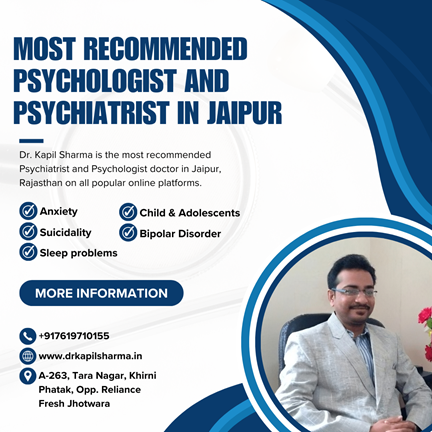
How Anxiety Affects Your Body and Mind
Anxiety is a common feeling that everyone experiences from time to time. It’s the feeling of worry, nervousness, or unease about something with an uncertain outcome. While it’s normal to feel anxious occasionally, chronic anxiety can affect both your body and mind in significant ways. Understanding these effects can help you manage anxiety better and take steps to improve your well-being. If you find that anxiety is impacting your life significantly, seeking help from a mental health professional can be beneficial. For residents in Jaipur, consulting the best psychiatrist in Jaipur can provide valuable support.
How Anxiety Affects Your Mind
- Persistent Worry: One of the main ways anxiety affects your mind is through constant worrying. This can make it hard to focus on daily tasks or enjoy activities you once loved. The worry might be about things that may not even happen, but it still takes up mental energy and can be exhausting.
- Difficulty Concentrating: Anxiety can make it difficult to concentrate on tasks. Your mind might be constantly racing with worries, making it hard to focus on work, study, or even conversations with friends and family.
- Sleep Problems: Anxiety often affects sleep. You might find it hard to fall asleep, stay asleep, or have restless nights. This can lead to feeling tired and irritable during the day.
- Negative Thinking: Anxiety can lead to negative thought patterns. You might start to believe that things will go wrong, or you might doubt your abilities and worth. This negative thinking can affect your self-esteem and overall mood.
How Anxiety Affects Your Body
- Physical Symptoms: Anxiety can cause a variety of physical symptoms. These might include a racing heart, sweating, shaking, or a dry mouth. You might also experience headaches, muscle tension, or stomach problems.
- Increased Heart Rate: When you feel anxious, your body releases stress hormones like adrenaline. This can cause your heart to beat faster. Over time, this can lead to heart problems if anxiety is chronic.
- Breathing Problems: Anxiety can affect your breathing. You might breathe more quickly or feel like you can’t catch your breath. This can sometimes lead to feelings of dizziness or lightheadedness.
- Digestive Issues: Anxiety can impact your digestive system. You might experience stomachaches, nausea, or changes in your appetite. Stress can also affect how well your food is digested.
- Weakened Immune System: Chronic anxiety can weaken your immune system, making you more susceptible to illnesses. When you’re anxious, your body is in a constant state of stress, which can reduce its ability to fight off infections.
Managing Anxiety
Understanding how anxiety affects your body and mind is the first step towards managing it. Here are some tips to help:
- Practice Relaxation Techniques: Techniques like deep breathing, meditation, or yoga can help calm your mind and reduce physical symptoms of anxiety.
- Stay Active: Regular physical activity can help reduce anxiety and improve your overall mood. Even a short daily walk can make a big difference.
- Talk to Someone: Sharing your feelings with a friend, family member, or mental health professional can provide support and help you manage your anxiety.
- Maintain a Healthy Lifestyle: Eating a balanced diet, getting enough sleep, and avoiding excessive caffeine and alcohol can help manage anxiety.
- Seek Professional Help: If anxiety is affecting your daily life, consider talking to a mental health professional. They can offer therapy, medication, or other treatments to help you cope.
Anxiety is a challenging condition, but understanding its effects and taking steps to manage it can lead to a healthier and more balanced life. If you’re struggling, remember that help is available, and consulting the Best Psychiatrist Doctor in Jaipur can make a significant difference.
Visit Our Location – https://maps.app.goo.gl/g5vZXR8Wu3rwFUEaA

